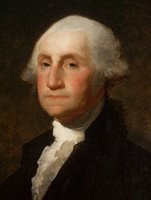 George Washington was one of the greatest leaders this country has ever had. He stood strong in battle, he persevered and was an encouragement to his troops in hardship, he was wise in government, and for all indications; he was a Christian.
George Washington was one of the greatest leaders this country has ever had. He stood strong in battle, he persevered and was an encouragement to his troops in hardship, he was wise in government, and for all indications; he was a Christian.Many attacks have been leveled against Washington. Yes, some of them are valid that he wasn’t the greatest of generals. But he wasn’t the worst either. Some have said that he was a price gouger, for example charging $10,000 to feed someone’s horse. Other statistics and prices have been recorded in certain books, with the intention of slamming Washington. But you have to remember that that those prices were in Colonial dollars, not modern ones. This currency had so flooded the economy that its value went down to almost nil. It was once remarked that a wagonload of paper money could hardly buy a wagonload of supplies. The attacks on his character are unfounded. Many who witnessed his courage were strengthened. You don’t win an impossible war by shrinking back and not doing anything.
As president, he ruled our country well. He helped the fledgling republic become a nation that could defend itself and be an example of free society. He advised, in his Farewell Address, that the U.S. should continue to expand trade and peaceful diplomacy in the world community; but that it should stay out of “entangling alliances.” In other words, peacefully influence the world for good, but don’t get involved in European wars or imperial conflicts. That’s good advice for any country, including ours then and today.
One interesting thing about George Washington’s vision for this country was his plan for the capital. He planned it on the Potomac for several reasons:
- It was on a river, thus trade and economic growth.
- It was geographically central to the country at that time, thus unity.
- It had mineral resources fairly nearby, thus industry.
- It was on the border between the slave South, and predominantly free North.
Washington envisioned a bustling commercial capital, central to the country and industrialized. He didn’t want a showy, opulent area for tourists, like France’s Versailles. He envisioned a center of industry with factories that would be an example to the South of the profit and potential of free labor. The South, which hadn’t become addicted slavery at that time, (cotton was not as profitable) could have been reformed. At any rate, Washington had a noble plan that was not carried out. Jefferson differed from Washington in his dream of the capital, and set out to build what we see today: a showy, more or less opulent place for tourists.
We should respect this great leader of our country for the great man he was, and not revile him because he didn’t fit in with modern views.
No comments:
Post a Comment